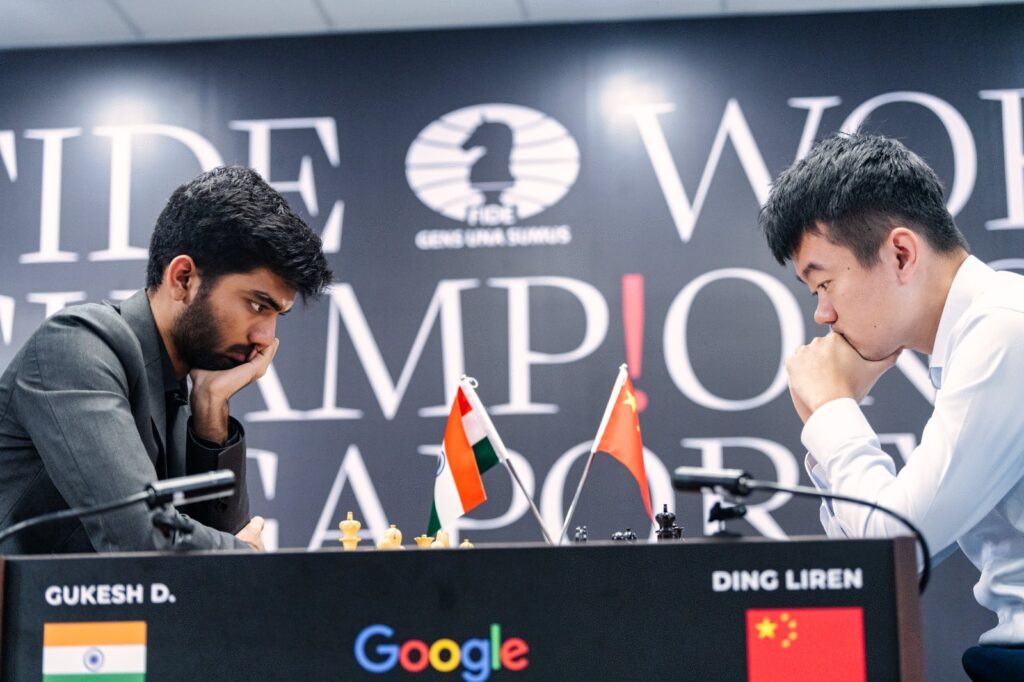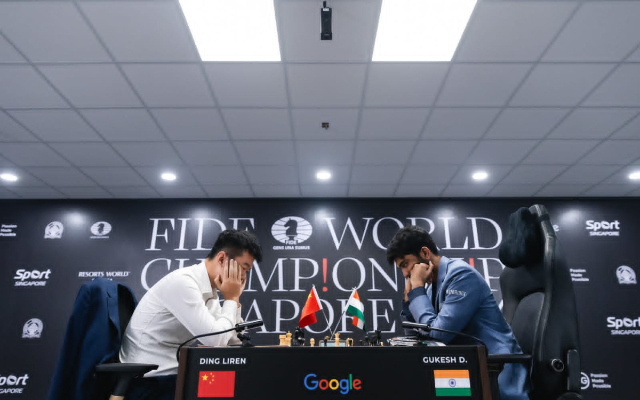
-Atreyo Mukhopadhyay in Singapore City
Every day when the players enter the playing arena and leave the press conference room after the game, there are about a few dozen fans crowding those places. They cheer for the players before the games and ask for autographs after them. Most of them are Indians rooting for D Gukesh. Fans of Ding Liren are also present, although fewer in numbers.
As the World Chess Championship duel nears the business end, the clamour around the Indian will increase and so will the pressure.
The players are tied at 4.5-4.5 after nine games. In the five games remaining, the defending champion will have white in three. That’s a slight edge for the Chinese, who has shown great resilience under pressure so far.
That’s one of Ding’s major characteristics. He can’t be beaten until he is beaten. In last year’s World Championship clash against Ian Nepomniachtchi of Russia, he fell behind thrice. He came back each time and went onto clinch the title on tie-breaker. He hasn’t conceded the lead to Gukesh at Resorts World Sentosa yet, but has had to wriggle out of tight situations a number of times.
Asked by RevSportz after the Game 9 if Ding having white in three of the five games is an advantage for the Chinese, Gukesh replied in the negative. “These days, with the use of computers and engines, playing with black is not much of a disadvantage. He played with white in four games over here and it was quite even in those games. Black or white shouldn’t make a big difference,” he said.
Gukesh has a point. In the five games he had white, he lost and won one apiece and three were drawn. All four games Ding played with white were drawn. Truth be told, Gukesh held an edge in a majority of the last six games. Ding had to fight the Indian and the clock, which actually cost him the third game. In every round, he has found himself under acute time pressure.

This brings us to the second part of this story. Ding has shown an uncanny ability to bounce back from inferior positions. In the first half of the games, he has fallen behind the clock but barring the third game, he has invariably bounced back. In some of the games, it was Gukesh who came under more time-pressure towards the end.
This suggests that Ding can lift his game when the chips are down. He himself admitted that he lost seventh game “many times” before he somehow stared finding the accurate moves and stonewalled Gukesh to deny him a certain win. This makes him a dangerous opponent, who knows how to find his way out despite not being in the best of shape.
On the positive side for Gukesh, his composure has belied his age. Being an 18-year-old, and up against the reigning world champion, he has displayed maturity one can seldom imagine. On most occasions, he has asked the questions and Ding ended up chasing the game. That confidence will be Gukesh’s biggest strength heading into the most crucial phase of this match.
Also Read: A frustrating draw for Gukesh in Game 9 of World Chess Championship



